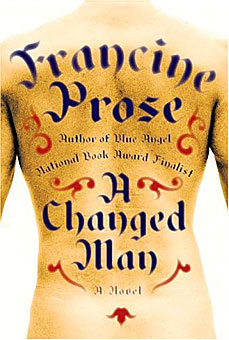 |
|
|
"A Changed Man" by Francine Prose
|
|
|
By Karinya Funsett
Arizona Daily Wildcat
Thursday, March 24, 2005
Print this
Francine Prose's latest novel, "A Changed Man," is smart satire at its best. This novel has teeth, and Prose masterfully uses her literary chops to carve out a deliciously witty story for the reader. If you're looking for gentle storytelling, look elsewhere. If you want sharp, edgy writing, then read on.
One of the strongest elements of the novel is its range of characters. Some are over-the-top outrageous, while others are exactly like your next-door neighbor. The reader gets to know each of the characters intimately through Prose's clever use of multiple points of view. These viewpoints, along with writing in the present tense, lends a sense of urgency to the story and allows the reader to get right in there with the characters. The characters' thoughts are often abrasive and real, packed with non-politically correct language and plenty of racial slurs. Prose, remarkably, is able to pull this off without offending the reader.
The most notable character and "hero" of the story is an ex-neo-Nazi skinhead named Vincent Nolan. Vincent had been a member of ARM - the Aryan Resistance Movement, or the American Rights Movement, depending on the situation - but had never fully bought into the ideology. The novel opens with Vincent's arrival in New York City, ready for a fresh start, armed with a rusty pickup truck, $1,500 and a mixed bag of prescription drugs, each stolen from his cousin Raymond and the ARM.
Raymond walks into the Manhattan headquarters of World Brotherhood Watch, a human rights organization headed by Holocaust survivor Meyer Maslow, determined to change himself. He wants to cut his ARM ties and, as he tells Maslow, "I want to help you guys save guys like me from becoming guys like me."
The initial meeting of the two men - one with swastikas and Waffen-SS bolt tattoos on his arm, and one with a line of blue numbers from Auschwitz - is one of the most dramatic and intriguing scenes of the novel. When the two men roll up their sleeves to compare tattoos, the tension and dirty history in the air is palpable.
From here, the real fun begins. Vincent moves in with Maslow's assistant, Bonnie, and her two teenage boys out in the suburbs. The first few awkward scenes with Bonnie's family and their adopted neo-Nazi are priceless, and the dialogue - both in these scenes and throughout the book - is sharp and brilliant. Vincent's character keeps the reader on their toes as he becomes more fully developed through each scene, revealing more of his motivations and fears. He's no angel, but as the book progresses and he unwittingly becomes a celebrity poster boy for the organization, I found myself rooting for him.
There are a number of clever supplemental storylines that help carry the book through the sometimes-slow moving middle section. At 421 pages, the length of the book is probably its only serious flaw. While it doesn't drag terribly, a tightened-up midsection would better sustain the fast pace and tension provided at the beginning and end. Still, Prose's colorful cast manages to entertain the reader even when the action lags.
"A Changed Man" is a fine example of skillfully crafted satire. Prose doesn't scream her social critiques from the rooftop, but slips them in through very real aspects in the lives of the characters. This book goes after the importance of celebrity in our society (Maslow can't stop his bleeding heart from being jealous of the celebrity status of Elie Wiesel), the media (a cross between Jerry Springer and Montel Williams provides the venue for the complete exploitation of Vincent, and for the only violent scene in the novel), the liberal world of non-profit organizations (the idolization of their leaders and fundraising charades), and the importance of political correctness in our society (a boy's mention of Hitler's possible homosexuality leads to an expulsion as punishment for his homophobia).
"A Changed Man" is a darkly comic masterpiece. Its witty writing, sharp dialogue, harsh social criticism and intriguing characters combine for an extremely enjoyable, un-politically correct and hilarious read.
